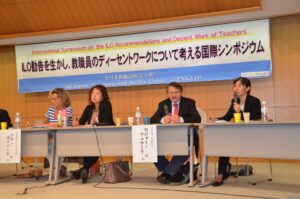News
International Symposium

ZENKYO on May15 held the “International Symposium on Decent Work of Teachers in the Light of ILO Recommendations”. Mr. Roger Ferrari of SNES France and Ms. Ana Gaspar of FENPROF Portugal took part in it and reported about the working conditions of teachers and education policy in their respective countries, both members of the European Union.
At the outset, Yoshihisa Kitamura, President of ZENKYO’s National Executive Committee, speaking on behalf of the organizer, indicated that the aim of the symposium was to “look at the problem of long working hours of Japanese teachers in the light of the international standards” and to “learn from each other” all that could be shared among teachers of France, Portugal and Japan.
Mr. Ferrari stated that under neoliberal policy, education budget in his country is far from meeting the needs and the announced increase in teaching posts is also insufficient. As for teachers, their salaries have been frozen for years while the number of hours of teaching to children as well as other duties are gradually increasing. He also pointed out that the increasing number of contract teachers is a result of the government austerity policy.
Ms. Gaspar described the situation in her country after the revolution in 1974. As a result of the effort of “massification” of education, children who were held away from school for socio-economic reasons are getting back to school. However, the problem of illiteracy is persistent and the school attendance rate remains low in comparison with developed countries. Only 18% of children go to universities. Today, because of neoliberal policies imposed by the EU, the entire education system in Portugal is in crisis, with growing non-regular teachers losing jobs, hasty mergers of schools and significant increase of working hours of teachers.
After these two reports from overseas participants, Mr. Kenji Imatani, ZENKYO General Secretary, spoke about “the reality and problem of long and intensive working hours in Japan”. He was followed by Mr. Yasuhiko NAKATA, Professor at Itotsubashi University, who analyzed the results of the ZENKYO’s recent survey on teachers working conditions.
In the Q and A session, the understanding of the realities of teachers’ condition in France and Portugal was further deepened. The participants voiced their surprise when Mr. Ferrari said that basically teachers in his country go home after they have finished their classes. They also shared Ms. Gaspar’s commitment to solidarity and struggle for the sake of education and children and her resolve to never give up and continue to fight back.
The symposium ended with the recognition of the importance of pursuing the actions, learning from other countries experiences and relying on the established international standards regarding teachers and the resolution to develop the struggle in favor of decent and humane work. The symposium participants in unanimity decided to send a message of solidarity to teachers in strike across France on that day for getting their demands met.
